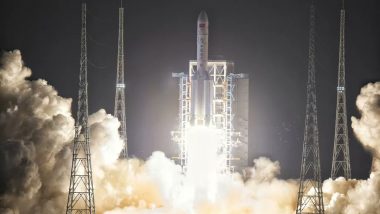Beijing, December 22: China's new medium-lift carrier rocket Long March-8 made its maiden flight on Tuesday, sending five satellites successfully into planned orbit, the country's space agency said. The rocket was launched from the Wenchang Spacecraft Launch Site in Hainan.
The five experimental satellites will carry out the in-orbit verification of microwave imaging and other technologies. They will conduct experiments in space science, remote sensing and communication technologies, official media reported. China Launches Two Satellites for Gravitational Wave Detection.
The Long March-8 rocket which has a total length of 50.3 meters, and a take-off mass of 356 tonnes can carry a payload of at least 4.5 tonnes to a sun-synchronous orbit at an altitude of 700 km, the China National Space Administration (CNSA) said.
The rocket fills the gap in China's launch capability to the sun-synchronous orbit from 3 tonnes to 4.5 tonnes, and is of great significance for accelerating the upgrading of launch vehicles, it said.
On December 17, China's Chang'e-5 probe successfully completed the mission to bring home the first samples of the moon in over 40 years. A major space power, China launched its first Mars mission ‘Tianwen-1' on July 23 this year. The Mars spacecraft which included an orbiter, lander and rover is on its way to the red planet.
The new rocket, which was developed by the China Academy of Launch Vehicle Technology (CALT), will enrich China's launch vehicle variety and help expand the country's aerospace activities, state-run Xinhua news agency reported.
It will promote the upgrading of China's medium-sized launch vehicles and satisfy the needs of high-density launch missions for medium and low-orbit satellites Xiao Yun, chief commander of the rocket said.
Song Zhengyu, chief designer of the Long March-8 rocket from the CALT, said the design of the rocket was based on technologies developed for previous Long March rockets.
"It will lay a technological foundation for the development of large and heavy rockets, shortening development periods and reducing costs," Song said. The rocket can send one or multiple satellites in a single launch, and can undertake launch networking missions for low-Earth orbit satellites, according to Wu Yitian, deputy chief designer of the rocket.













 Quickly
Quickly

















